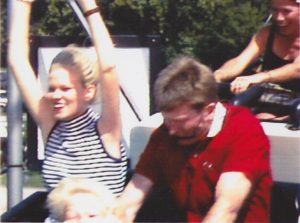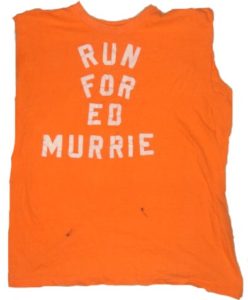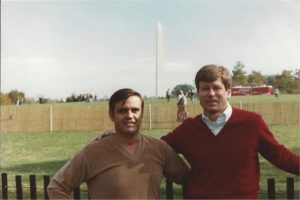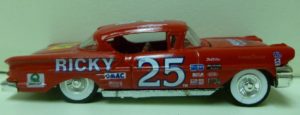Life’s Lessons by Karl F. Krehbiel
Through the years, certain life experiences have inspired Karl to take pen to paper. Below is a sampling of his short stories or "Life's Lessons."
 It’s Easter Sunday in April 2006, a day signifying hope for many, and you may think I’m nuts. But I look forward to tomorrow. Twenty-two years ago, I wrote “Thank goodness it’s Friday? No, thank goodness it’s Monday.” The theme was some of us spend too much time wishing, waiting and planning for the weekends, as if these leisure days were some kind of utopia or elixir. Successful and happy people, I wrote, see Monday as a new beginning, a chance to make a contribution. Weekends are overrated. Yes, they’re good for resting, for reading and writing and for partying with family and friends, but I enjoy my work so much that I can’t wait to get back to it.
It’s Easter Sunday in April 2006, a day signifying hope for many, and you may think I’m nuts. But I look forward to tomorrow. Twenty-two years ago, I wrote “Thank goodness it’s Friday? No, thank goodness it’s Monday.” The theme was some of us spend too much time wishing, waiting and planning for the weekends, as if these leisure days were some kind of utopia or elixir. Successful and happy people, I wrote, see Monday as a new beginning, a chance to make a contribution. Weekends are overrated. Yes, they’re good for resting, for reading and writing and for partying with family and friends, but I enjoy my work so much that I can’t wait to get back to it.
And speaking of living for time off, I was moved recently by a book I read authored by Eugene O’Kelly called “Chasing Daylight.” Gene was CEO of KPMG, a large accounting firm. In perfect health, financially secure with a loving family, he was diagnosed in May 2005, in his early fifties, with three inoperable cancerous brain tumors. In this memoir, a work his wife completed after Gene died in September 2005, he contemplates his “forthcoming death” as he examines commitment, living and letting go. “Commitment,” he says, “is not about time. It’s about depth, effort and passion.” He follows with “No more living in the future. Or the past, for that matter – a problem for many people . . . . .” And in the final months of his life, Eugene O’Kelly committed his life to depth, effort and passion in the present. And he let go of everything but the present.
 A few weeks back, I was talking with a friend who is clinically depressed. His dejection emerged from his desire to do more in his career, to contribute more to his employer, and to the betterment of mankind. In order to do this, he felt he needed to spend some time away from his family. His wife was dead set against the idea, and for her own reasons, wanted him home every night. When he resisted, she threatened to take the kids and leave him, and he became more despondent. He kept hoping she’d see his point of view, but it didn’t happen and, in time, despair set in. As humans, when sorrow takes over, and circumstances become too much to bear, we become detached. It’s the way we cope; it’s the way we separate ourselves from our genuine wishes when we think we can’t have them. It’s how we survive. We become numb, and we don’t care. We feel we can no longer move forward. At times, to protect my own sanity, I traveled this dispassionate road during my one-year tour in Vietnam. And that is what happened to my friend. His fear of losing his wife and kids trumped his desire to develop. Because of this anxiety, he chose to heed his wife’s wishes and forgo his own. Clinging to lifelong habits, he became distant and unable to ripen and unable to live in the present as he yearned for yesteryear and lived for idle hours.
A few weeks back, I was talking with a friend who is clinically depressed. His dejection emerged from his desire to do more in his career, to contribute more to his employer, and to the betterment of mankind. In order to do this, he felt he needed to spend some time away from his family. His wife was dead set against the idea, and for her own reasons, wanted him home every night. When he resisted, she threatened to take the kids and leave him, and he became more despondent. He kept hoping she’d see his point of view, but it didn’t happen and, in time, despair set in. As humans, when sorrow takes over, and circumstances become too much to bear, we become detached. It’s the way we cope; it’s the way we separate ourselves from our genuine wishes when we think we can’t have them. It’s how we survive. We become numb, and we don’t care. We feel we can no longer move forward. At times, to protect my own sanity, I traveled this dispassionate road during my one-year tour in Vietnam. And that is what happened to my friend. His fear of losing his wife and kids trumped his desire to develop. Because of this anxiety, he chose to heed his wife’s wishes and forgo his own. Clinging to lifelong habits, he became distant and unable to ripen and unable to live in the present as he yearned for yesteryear and lived for idle hours.
Having read O’Kelly’s book and having listened to my colleague, I’m more convinced than ever that hanging on is self-defeating, and living for vacation is not productive. If one definition of success is to be happy, then the destination means nothing. It’s the journey that counts.
You may have read the story about Harry who, while mountain climbing, fell off a cliff and, as he fell, managed to grab a small branch on the side of the butte. Holding on for dear life, he screamed, “Help! Help! Is anybody up there?” A voice, clearly the voice of God, spoke directly to Harry and said, “Harry, I will save you. Let go, Harry, let go.” Harry thought about this a while, and he looked up and shouted, “Is anybody else up there?”
Letting go isn’t easy; it takes courage. We have a print displayed in our family room that illustrates my personal unwillingness to do so. Not wanting to appear cowardly, I agreed to ride the Magnum roller coaster at Cedar Point with our daughter, Rachel. At one moment in the high speed ride, a camera took our picture. The snapshot shows Rachel with both hands raised on high and grinning with delight as I hang on with so much force that the veins in my neck are ballooning like the swollen rivers of springtime in Cleveland. This image is a microcosm of what happens when we do not let go. Clutching old ways, we miss life, the momentous roller coaster ride, which hastens to a finish line unknown to all, bequeathing us only a photo of the present we leave behind.
Copyright Krehbiel and Associates, Inc., April 2006
Revised June 2007
Many years ago, I was associated with a company that had a marketing program designed to raise the esprit-d-corp of the employees. It was called: “One person can make a difference.” In theory, it was a great idea because I believe one person can make a difference. The company handed out “Number 1” buttons and gave away prizes to workers who took action that contributed to greater profitability. Today, I can’t remember a single work that anybody did that resulted in positive change, although I’m sure there were some. It wasn’t long before the project withered and faded away from lack of attention. Does this sound familiar? An idea with no muscle behind it is like belief with no commitment.
Not long ago, the same theme jolted me when Anne and I were having dinner at a local restaurant with some friends. One of them posed this question: “What difference do our lives make? We’re all going to die anyway. And what difference are you making?” she inquired of me. Convinced that most of us would like to make an impact in this world or at least believe we’re doing something special once in a while, I confess that my response was pathetic. “I’m doing my best, and I’ve gotten a lot of thank you notes,” I whimpered. The next day, I imagined all the snappy comebacks that I wished I had thought of on the spot, and I felt guilty for not giving her question more respect.
Fact is, I spend most of my days trying to figure out how to produce more sales, more revenue and more profits for the company. To some degree, many of us are forced into this mode because of global competition and the rapidly changing business environment. In our company’s world, the vendors we represent expect increases every year, and, at times, our relationships, under pressure, become strained and uncomfortable. Get ten pounds of stuff in a five pound bag or be gone is the implied credo. In defense of this mind set, I feel that our manufacturers do not make the rules. The rules are made by Econ 101. We are the messengers in this kill or be killed culture. And, each day, like everybody else, we at Krehbiel and Associates board the speeding train headed towards greater earthly abundance, often without consideration given to our methods. Sometimes we see things only one way, and that’s our way. At times, we work ourselves into a foul mood, and we take our customers, our associates, and our friends for granted.
Good news is there is a way to satisfy the demands and still keep ourselves from falling into a heartless funk. But we must change our point of view and focus on the positive. How about patience, understanding and compassion, the attributes I need to pursue? The downside of this improved attitude is by cleaning up my own act, I may leave some profit behind. By being sensitive to the needs of others, I might not achieve my financial goals. By putting my ego and wishes aside, I might not get more. Could it be that I should make a difference in some other way?
Charles Handy, successful British scholar tells this story: “I once asked my 24 year old daughter what she thought she was doing with her life, dabbling in this and that, traveling, adventuring, socializing.” “When,” I said crossly, “are you going to find a proper career, make a serious contribution to this world?”
“There are many people,” she said, “who rely on me for comfort and for help, who use me as their home. I learn something new each day, I laugh with someone every day, I cook for someone almost every night. I don’t think that’s bad for 24.” Mused Handy, “I wondered how long it would be before I could say the same.”
We hear often “what gets measured gets done.” If true, how are the efforts and results of Billy Graham, Mother Teresa or Charles Handy’s daughter appraised? Relationship building is vital, and our friend’s question is significant. What difference are you making? As somebody once said, “Measuring more is easy; measuring better is hard.”
Copyright Krehbiel and Associates, Inc., January 2006
Revised June 2007
Recently, I watched a made-for-television documentary on Operation Roberts Ridge, titled after an army ranger named Roberts. The action was a rescue and recovery mission conducted a few years ago by the U.S. Army in the treacherous and mountainous terrain of Afghanistan. During a combat exercise, Roberts fell out of a transport helicopter and was missing in action. Operation Roberts Ridge is the story of the army rangers who returned to the hot zone to recover their fallen comrade who did not survive. On the campaign to retrieve the body, seven U.S. soldiers died in combat. With this in mind, I revisit a story I told nearly five years back.
In my ROTC classes at the University of Illinois over forty years ago, our instructor, Major Mort, harped on the theme of mission and men. “These two,” he bellowed, “are the family jewels of the soldier.” Number one, he emphasized, is the mission, number two the men. Relentlessly drumming our class with this message, he stopped one day in mid-sentence and yelled toward the back of the room. “Do you understand, Cadet Conner?” “Yes, sir, Major Mort,” shouted Conner. “OK, Conner,” said the major, “You are in charge, and we’re on patrol; we’re being ambushed. I’m hit bad; I’m bleeding something awful. I can’t go on. What are you going to do? Don’t forget, mission first.” The room was dead silent except for an occasional cough. Many eyes were riveted on Conner, eyes wondering what he would do, and what he would say. Most of us cowards were just glad we weren’t Conner. Before he could answer, the major went after Cadet Spevak. “What about you, Spevak, what would you do?” Spevak stood. “Sir, I, I, I, I would . . . .” “Better hurry, Spevak, I’m bleeding to death!” Around me, I heard a few nervous chuckles, but not loud enough to draw the major’s ire. Then Conner, after a minute or two, spoke, his voice crackling like a CB radio. “Sir, mission is number one, sir.” Ah yes, in the military, this is called the sir sandwich; sir, then the thought, followed by another sir. “Sir, I would dress your wounds and make you as comfortable as possible, maybe under a tree, sir. Then I would leave with the rest of the men to complete the mission.”
The clammy and dark classroom, I remember, felt like the putrid morgue I would visit as a twenty-three-year-old first lieutenant in the stench-filled air of the Republic of South Vietnam. “So,” screamed the major, “Let me see if I understand you, Conner! You’d leave me to die, and you’d carry on, is that right?” Like piano wire, the tension in the room was kin to the uneasiness I felt in the eerie darkness of the Asian rubber trees as I wondered whether there was a sniper’s bullet or a Viet Cong rocket out there with my name on it. Then Conner spoke, “Yes, sir, I’d leave you; you said it’s mission first.” The major became highly agitated, his eyes tearing with indignation. He marched down the aisle towards Conner. Nose-to-nose and glaring at him, he enunciated slowly: “Conner, if you leave me, and I don’t die, I will find you. And when I find you, I will cut out your heart. And I will leave you to rot. Do you hear me?” Every eye engaged the major who was nearly foaming at the mouth. “Yes, sir, major, sir!” Then the dejected, deflated and beaten Conner slumped to his chair as did Spevak who had dodged the major’s verbal bullets.
The situation posed by the ROTC instructor is fascinating because military training affirms clearly the mission, then the men. In our business environment, which is not life threatening, I am saddened to see people, the world’s most precious asset and resource, treated like expendables as they are forsaken for the conceivable fulfillment of the assignment. Who among us would voluntarily follow or trust a leader whom we know will desert us in a heartbeat for the goal? The answer to the quandary is mission and men are like a loving couple; they go hand-in-hand. They are inseparable. As leaders, schooled by Major Mort and the example set by the soldiers at Operation Roberts Ridge, we are challenged to reach the objective without sacrificing the troops. And I believe all of us are commissioned to nurture those we touch as we pledge never to leave anybody behind.
Copyright Krehbiel and Associates, Inc., December 2002
Revised May 2010
 With Father’s Day only a few weeks away, I am inspired by a recent column in the Cleveland paper written by a woman whose father spent “36 years in a job he hated,” and who “wore his body out so that his four kids could live a life he never knew.”
With Father’s Day only a few weeks away, I am inspired by a recent column in the Cleveland paper written by a woman whose father spent “36 years in a job he hated,” and who “wore his body out so that his four kids could live a life he never knew.”
All of this got me thinking about a friend of mine, Ed Murrie. The oldest of eight children, Ed was born in 1911 on a farm in Simpson, a town in southern Illinois. Simpson is a hamlet so tiny that it doesn’t appear in Rand McNally’s listing of cities for the state. The nearest large municipality is Vienna, population 1,420. The school in Simpson covered only two years of high school, so Ed traveled nine miles to Vienna to finish and to graduate. He rode on horseback and lived with a family in Vienna, paying for room and board by doing chores. He never went to college, but he met Margaret Cox, the youngest of six, who was working her way through college. In 1939, they married, and Margaret had her degree and a teaching certificate.
At the bidding of two of Ed’s friends, the Gray brothers, the just-married couple headed 350 miles north to the blue collar town of Lockport, Illinois, where job opportunities existed at a newly established Texaco refinery. It was there that Ed found steady employment as a meter reader working a different shift each week for thirty-five years. Margaret found a teaching position nearby, and in 1947, the couple bought a four thousand dollar bungalow to shelter a family which had grown to three offspring on August 6, 1946, with the birth of Anne Catherine, my current and only wife of nearly forty years.
In December, 1964, I met Ed, a docile and unpretentious man with no ambition for himself. His only objective was to make sure all three of his kids finished college so that all could land meaningful jobs, a lofty goal for a person who never made more than $13,000 per year! When I met him, his mission was about half accomplished. In 1965, son, Eddie, graduated. In 1966, daughter, Sue, finished, and in 1969, my wife, Anne, got her degree a year late because she had dropped out of school when we married and traveled to Fort Irwin, California, for my stateside duty as a new second lieutenant in the Army.
When I received my orders for Vietnam in June 1967, Anne and I drove from the California high desert to her parent’s residence in Lockport. Ed and Margaret welcomed us and showed both compassion and support for our uncertain year ahead. As I boarded the plane in Chicago for the beginning of a twenty-four hour flight to Bien Hoa, South Vietnam, their send-off was quiet, dignified and loving. While I was in Vietnam, Anne finished her third year in college, and when I returned, with Ed pushing gently, she completed her fourth year including a degree with honors, even though we lived 220 miles apart.
In the late summer of 1974, we got the call. Ed was ill; he was losing weight. In his 62 years, he had not been sick often. He didn’t complain, was always upbeat and had never been hospitalized. Tests in a local medical center were inconclusive. Reluctantly, Margaret and he got on a jet in Chicago bound for the Mayo Clinic in Rochester, Minnesota, their very first airplane ride. After we received the news that he had stomach cancer, Anne and I made the 700 mile drive to Mayo from Cleveland during the Labor Day weekend. At the time, Riki was learning to walk. And those of you who know Riki understand that I had my hands full chasing her around the hospital grounds while Anne visited with her parents. The prognosis was the worst. Three months to live. Barely 63 and with retirement only a few weeks away, Ed returned to Lockport and a few weeks later to an infirmary near there to spend his final days. Anne and I commuted every weekend that fall. One day, sporting a t-shirt imprinted with the words “Run for Ed Murrie,” a shirt still protected in my duffel bag for over 30 years, I raced the nine miles from Lockport to the hospice in less than an hour to show my respect for this friend in need. During that run, I pondered one of the mysteries we all face. Why was this happening to a clean living, honest and caring soul? Why was this happening to one of my loyal fans who supported me even though I hardly knew him, a man I longed to get to know in life’s more important dash against our time on earth?
The end approached in early December 1974. The doctors could do no more, and Ed came home one final time, to the same place Margaret and he had purchased twenty-seven years earlier. On a Sunday evening, I drove to Cleveland in a snowstorm, leaving Anne and Riki behind. The next morning, Anne called to tell me that Ed, surrounded by his wife and three children, had passed.
On the lonely six hour return trip to Lockport, I had plenty of time to think about this individual, an ordinary person with no aspiration other than to make sure his kids’ lives were better than his own. As I write, I am captured by the feelings, long suppressed, I have for this simple human as I wish I had known him better. At times, I dream he is alive, and I envision what a great relationship we would have if he were here today. Surely, I would tell him: “Mission accomplished, my friend, and Ed, I hardly knew you.”
Copyright Krehbiel and Associates, Inc., May 2006
Revised May 2010

In September 1948, I met my friend Todd. Both of us were pushing five years old. We bonded immediately. Why is it that we connect with some people but not with others? Usually, the chemistry is superb early in the relationship if it is to grow and survive. That was true with Todd and me. For years, I had searched for the answer to this enigma until a wise friend declared: “We must all learn to live the questions.”
Todd was a dreamer and so was I. As little kids, we were soldiers, and we made a parachute out of an old blanket and some rope. We were about to jump from the second floor window when his mother called us for lunch. When she discovered what we were doing, she squelched the parachute idea. And so I live to tell you my story.
 When we were both nine, we tried out for the Indians, one of the local Little League teams. Todd made the team, and I got cut. A few weeks later, I tried out for the Lions and made the team, so we were both happy. When we were sixth graders, Todd went to a private school, and we didn’t see much of each other until he moved to a big house a few miles away. Whenever I could, I would get on my bike and ride to his house where we would play soldiers and Indians, play catch or put on boxing gloves and pound on each other. We both went to the same high school, but we didn’t hang out together; I don’t remember why. With high school completed, Todd went to Jacksonville University in Florida, and I went to the University of Illinois. We didn’t see each other for those four years.
When we were both nine, we tried out for the Indians, one of the local Little League teams. Todd made the team, and I got cut. A few weeks later, I tried out for the Lions and made the team, so we were both happy. When we were sixth graders, Todd went to a private school, and we didn’t see much of each other until he moved to a big house a few miles away. Whenever I could, I would get on my bike and ride to his house where we would play soldiers and Indians, play catch or put on boxing gloves and pound on each other. We both went to the same high school, but we didn’t hang out together; I don’t remember why. With high school completed, Todd went to Jacksonville University in Florida, and I went to the University of Illinois. We didn’t see each other for those four years.
After I graduated in 1966 as a second lieutenant, Anne and I traveled to the U.S. Army Desert Training Tank Center at Fort Irwin, California. In June 1967, I received my orders for Vietnam, and shortly thereafter, on a Saturday morning, I got a telephone call from Todd. “Where are you?” he asked. “Where are you?” I countered. “I’m at Post Headquarters. Are you going to come get me?” “How’d you get through security?” I enquired, realizing also that Headquarters was thirty-seven miles one way in and one way out from the military police check-point and Barstow, California. “Never mind. Are you coming or not?” “I’ll be there in a few minutes.” When I arrived, Todd was parked squarely in front of the entrance to the Post Headquarters Building, and he was sunning himself on top of his car roof. Today, he’d be arrested for loitering or trespassing or lunacy. Can you believe my friend Todd had driven hundreds of miles to find me in California’s high desert not knowing if I’d be home?
During our visit, he talked about trying to find himself; he had graduated from Jacksonville but didn’t have a job. “Why don’t you join the service?” I asked. That’s all he needed to hear. To this day, he tells everybody who will listen that I shamed him into the U.S. Marine Corps by asking him if he intended to serve his country. Is it true? Absolutely not. But he’s been telling the story with conviction for thirty-seven years. Shortly after I returned from Vietnam in September 1968, Todd was deployed to the DMZ in South Vietnam as a Marine Corps second lieutenant.
Years passed and we saw each other occasionally. In 1985, while living in Orlando, Florida, he called and asked me if I’d like to join him on Veteran’s Day, in Washington, D.C., for the dedication of the Vietnam Soldiers’ Monument. The monument would be dedicated three years after the Wall. I told him “No,” but Anne encouraged me to go, and so we hooked up in D.C. to view the Wall, which I had not seen, and the new monument. Among the visitors were multiple amputees, the sight of which brought back painful memories and made me feel both fortunate that I was alive but also guilty that I had survived the war without a physical scratch. Because we were Vietnam veterans on a special day, the local pubs bought all our drinks. Todd and I roomed together at the Marriott, and our evening was reminiscent of the sleepovers we had as little guys. We swapped stories then as we had done decades before.
Again years slipped away until he called in September 2003 to say he was going to have double knee replacement surgery. The procedure didn’t go well, and he was in intensive care for several days. I stayed in touch with his family until he made a full recovery.
In July 2004, we talked, and Todd said he’d drive to Captiva Island, Florida, to meet Anne and me while we vacationed on the island for the first time in twenty years without the kids. He drove five hours Thursday afternoon even though he had worked all night Wednesday. The three of us enjoyed dinner that evening, and then two gimpy sixty year-olds and Anne strolled a few hundred yards to the Gulf to view one last sunset before our early Friday departure.
On Friday morning, we had breakfast, Todd left for Orlando, and Anne and I drove to the Fort Myers airport. Before leaving, he handed me a tiny red Hot Wheels car, packaged in clear plastic with the name “Ricky” on the side of the car. The Germans have a tradition; they recognize their children by the last half of their middle name. My middle name is Frederick; I’d been called “Ricky” since the day I was born and would always be Ricky to my friend Todd.
Each day in our business world, I am driven to spend more effort increasing sales and profits. We must perform, even though I’ve read that almost nobody on his deathbed wishes he’d spent more time on the job. And in the end, sales and profits will not be important. Only love and friends like Todd will matter.
Copyright Krehbiel and Associates, Inc., August 2004
Revised June 2010
